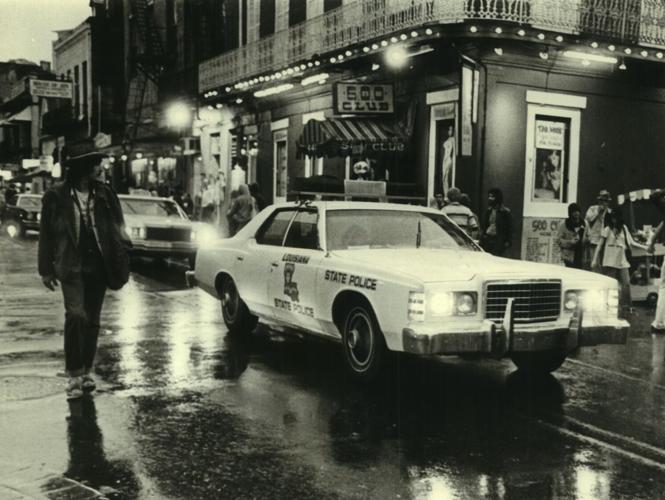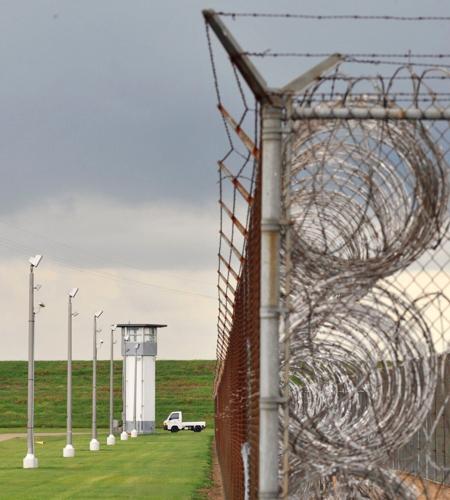Warren Harris Jr. sat behind a stack of papers last week at the Louisiana State Penitentiary, a handkerchief at the ready for the tears that had begun to fall behind his glasses.
Nearly a half-century ago, at age 16 and high on drugs in New Orleans, Harris robbed and fatally stabbed at least three men in and around the French Quarter. He was convicted in 1977 on three counts of first-degree murder for killing Jack Savell, Alden Delano and Ernest Pommier.
Authorities at the time alleged that Harris was a sex worker who committed the murders after having sex with his victims, during a heroin binge that ran for several weeks. The murders prompted the New Orleans police superintendent to publicly caution the city's gay community.
After 46 years in prison, Harris, 63, sought mercy Wednesday morning from the state parole board, needing two of three panelists to stamp his freedom.
"I read all 200 pages of your file several times, and I have gone back and forth on this," said board member Jerrie Ledoux, who appeared on a screen in front of Harris. Appointed this year by Gov. Jeff Landry, Ledoux had previously served on the board during Bobby Jindal's administration.
"I believe that you're ready for the streets," she said finally, voting in favor of parole.
Board member Steve Prator, also a Landry appointee and until recently the Caddo Parish sheriff, cast his vote for keeping Harris in prison. Prator likened a reformed Harris to a smoker who quits after getting cancer: "They still have the cancer," he said. "They still have to pay the price for what they did."
Harris seemed to hold his breath for the third and pivotal vote.
"It was a very horrific crime,” said board member Curtis "Pete" Fremin Jr., a former state director of probation and parole, and a holdover on the board from the administration of John Bel Edwards, “but I do feel that you've done all you can do at Angola."
With that, Harris’ release from state prison was approved. He lifted his glasses and pressed the handkerchief against his cheeks.
Harris, who entered prison a 16-year-old boy, followed a well-trod path for prisoners sentenced to life in Louisiana for crimes committed as juveniles. He is among several former "juvenile lifers" who have been granted parole under a 2017 state law that made them eligible for it after 25 years.
The law followed a pair of U.S. Supreme Court rulings that relied on juvenile brain science to conclude that no-parole life sentences for juveniles are unconstitutional for all but "the rare juvenile offender whose crime reflects irreparable corruption." The court made its 2012 ruling in Miller v. Alabama retroactive in 2016 in Montgomery v. Louisiana, opening the chance at parole to roughly 300 Louisiana prisoners.
The 2017 law gave prosecutors a window to seek hearings for those they sought to keep locked up for life.
According to the Louisiana Center for Children's Rights, the vast majority of those 297 juvenile lifers won parole eligibility once they've served 25 years, attained a GED or adult education and stayed free of major discipline for a year.
At least 120 of those juvenile lifers have been released, either through parole hearings or agreements with local prosecutors. In a handful of cases, judges have maintained life-without-parole sentences, while 13 still have hearings pending, according to the center. Almost half of those 297 juvenile lifers remain in prison. Some are awaiting eligibility, others a parole hearing.
Wednesday's hearing for Harris presented the board with a particularly depraved series of crimes to go along with numerous testaments to his rehabilitation while incarcerated.
Board members on Wednesday credited Harris for his status as a prison trustee, no major disciplinary write-ups for seven years, and after six tries, the GED he received in September. The degree marked the last step for Harris to become eligible for parole, said Francis Abbott, the board's executive director.
Drugs and regret in French Quarter killings
The Times-Picayune reported in April 1977 that Harris' crimes were motivated by a "revulsion of homosexuals." No such details were discussed at Wednesday's hearing, where Harris apologized to the families of his victims.
"During my years of incarceration, guilty feelings have gripped me deeply," Harris said. "My guilt has motivated me to call out to God, asking for his help for change within myself.
"My prayer had been answered. God allowed me to reevaluate my life and set me out on a positive course. I've become a server giving my time and the very little resources that I have helping those who cannot help themselves."
Harris was indicted in 1977 on four counts of first-degree murder. He was acquitted in one: the killing of a man named Robert Gary. Harris accused police of coercing him into a confession, but the Louisiana Supreme Court upheld his convictions, and a judge sentenced him to three consecutive life terms.
Before the parole board last week, Harris attributed his crimes to the influence of drugs.
"I was in need of money to support that drug, the drugs I was using at the time. I became affiliated with some of the victims and was asked to accompany them to their home, and at the time when we entered the home, I robbed and killed those men, and I regret it, and I'm so sorry every day," Harris said.
Harris said his drug courses in prison have prepared him for release. Still, the board mandated drug testing for Harris twice a month for six months. He'll be aided by the nonprofit Louisiana Parole Project, which provides housing and services to formerly incarcerated men and women.
Kerry Myers, its deputy director, argued on Harris' behalf Wednesday, saying juvenile drug addiction causes erratic behavior.
"Mr. Harris is now not a 16-year-old addicted child," Myers said. "He is a 64-year-old man who has served 46 years for these crimes. He has a support system."
No family members of Harris' victims were present or offered a statement at the hearing. Orleans Parish District Attorney Jason Williams' office did not weigh in, following a longstanding policy regarding parole board matters.
The New Orleans Police Department lodged the only opposition to parole for Harris, citing a general policy to oppose parole for anyone convicted of a violent offense, Abbott said.
Serial killer a 'changed' man, family says
Harris' sister, Brenda Palmer, teared up speaking for him over the video call. The two siblings had both simply returned to "the foundation on which we were brought up on, and that was the foundation of Jesus Christ," she said.
"Warren has been a father, uncle to my children, my grandchildren, and we lean on each other. When I go to visit, I don't just go to visit him. I go because I need him," she added. "I'm here to be here for him until the day God calls us all home."
Abigail Floresca, Harris' attorney, closed out the arguments in support of his parole, and redemption.
"Sixteen-year-old Warren sat in his grandfather's church, nodding off, high on heroin," Floresca said. "Sixty-three-year-old Mr. Harris has earned 41 certificates for bible studies. Sixteen-year-old Warren took the lives of multiple men. Sixty-three-year-old Mr. Harris takes care of the elderly and sick in hospice...Even children who commit heinous crimes still have the capacity to change."
Harris will be under state parole supervision for the rest of his life under the terms of his release.



